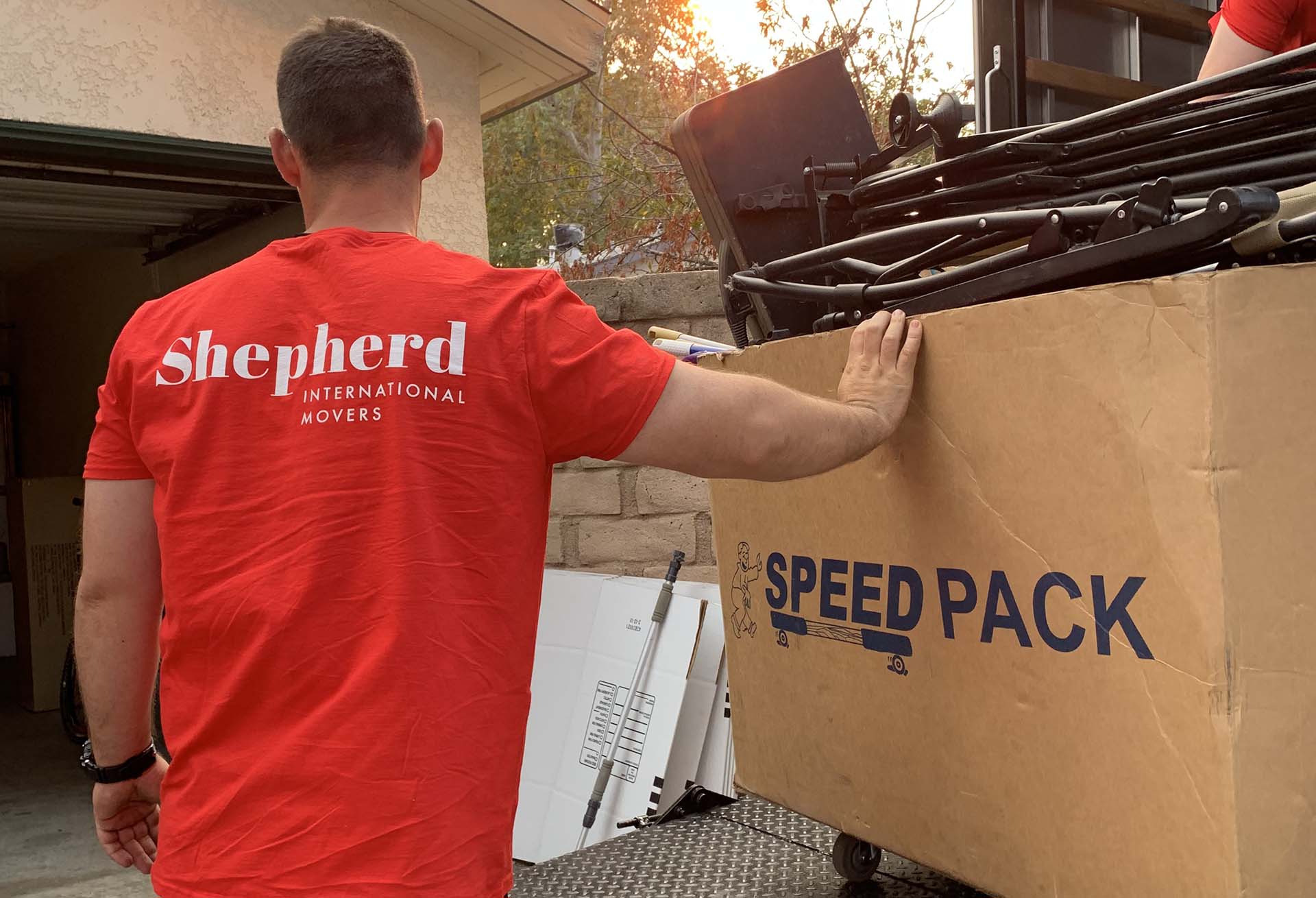

When you plan on moving abroad, there is so much on your mind. The paperwork, finding a job, becoming acquainted with the culture, and above all – getting all done in time. But in the middle of all that, you need to find reliable movers and not fall victim to moving scams.
Choosing the right professionals to help you relocate is never simple, and there are a few essential steps to take to avoid fraudulent businesses and pick a legitimate one. Checking their reviews, name changes, and ratings on Better Business Bureau is a must. You should also search Federal Motor Carrier Safety Administration to see if the relocation business has a USDOT number. Another thing that can help you protect yourself from being scammed is to notice any red flags on time.
Is There a Real Possibility of a Moving Scam?
Protecting yourself from being crossed doesn’t mean giving up on finding respectable movers and skipping investing in international moving services. Having professionals to back you up is extremely important for international moves, and it’s something you simply can’t handle on your own. But how much should you be wary of frauds?
According to the Federal Trade Commission, there were more than 2.1 million reports of fraudulent activity from consumers. The most common type of frauds were imposters, with online shopping con tricks following closely. Unfortunately, the relocation industry isn’t free of scammers either. Scammers targeted roughly around 1 in every 13,000 relocations, so there’s the same chance you’ll be scammed as to be struck by lightning during your lifetime.
How Do Moving Scams Work?
Con artists are slick and come up with new ways to scam people all the time. But how do these international moving company scams work? Here are the most typical fraudulent activities they come up with:
- If a relocating business gives you an estimate without asking you to do an in-house inspection of your possessions, you may be in for a nasty surprise at the end of your move across the world. Many of these frauds come up with ways to input hidden fees and charge you extra for some “unexpected events.”
- If a relocation business has piled up bad reviews in the past, they usually overcome this by changing the name of their enterprise. Hence, potential victims overlook this when checking the review section.
- Another thing they come up with is holding your goods hostage. Since relocating to another country takes some time, and your belongings are usually left in storage service until you settle, frauds may use this against you. They find some excuses as to why they can not deliver the goods and ask for large amounts of money to release your possessions.
These are just among some of the most typical ways frauds trick you into giving them money.

How to Protect Yourself and Spot Frauds a Mile Away
People moving out for the first time are inexperienced in all things that revolve around a move, especially an international one. But even if you have prior knowledge and you have moved before, you may not have picked up all the relocation hacks and tricks to help you spot fraudsters.
Imagine how relocation stress will be overwhelming if you get scammed and robbed of some of your money or possessions at the beginning of a new chapter of your life. So, how can I avoid being scammed by a moving company? And how hard it is to feel something’s amiss and notice scammers right away?
A Few Things to Keep In Mind When You Start Searching
If you haven’t moved that much before, you may believe that finding a company that has a crew of packers and movers is as easy as pie, but it’s far from the truth. One simple Google search can show you an abundance of results. It will display a long list of businesses and organizations offering to move you overseas, stationed near your current home, or to any other part of the US.
And we come to the next question – what should you not do when moving? What you should avoid at all costs is picking just one relocation business based on a hunch or the simple fact you don’t want to bother with an investigation. But that may be among the biggest relocation mistakes you make – you might be in luck and land in the hands of professionals, or your luck may turn south.
Get Yourself Armed With Knowledge
Doing in-depth research is vital, and that is why choosing movers should be done weeks before you move abroad. Once you’ve done your search on the internet and perhaps picked up a few recommendations from people around you, it’s time to narrow those choices down. When you have less than ten companies on your list, put on your Sherlock Holmes hat and do some digging.
Before you can pick the right movers that can move you to one of the friendliest countries in the world smoothly, the first thing you should look into is the reviews left by the customers. A wise thing would be to check whether there were any complaints, and that information can be found on the Better Business Bureau (BBB) website. If you look at their statistics, you’ll see that they have received around 230 moving scam reports in 2020 – 91% more than in 2019.
How Do I Know if a Moving Company Is Legitimate?
The next step would be to find some information about the relocation business on the Federal Motor Carrier Safety Administration (FMCSA) website. If the movers you want to help you relocate to one of the best countries to live in are legitimate and respectable, they will be registered there and have a USDOT number.
One more thing probably has you worried if you’ve stumbled upon some brokers – are all moving brokers scams? While the deal with middlemen on the market may seem pretty straightforward, you should bear in mind that they lack accountability. When you get to the core of the relocation process, it involves only two parties – individuals that want professional help to transfer and live abroad and the movers.
Important Tip
How do moving companies deal with scams? Reputable businesses have their USDOT number posted on their internet page, so their prospective customers can easily find it and research it.
The Red Flags Are an Indicator of a Moving Fraud
There is one thing every one of us wants and needs when they plan a relocation – for things to go smoothly so we’ll be able to move efficiently. And while one part of the relocation process is on us, like gathering documents needed to travel abroad, it’s important to have professionals handling your move that are trustworthy. So, while you get everything in the transition process sorted out, pay attention to the potential red flags.
Name Changes Can Be a Sign of a Fraudulent History
Visiting the company’s website to read the reviews and additionally checking BBB for signs of complaints is the step in the right direction, so ensure this step is high on your to-do list. But to spot a red flag, you will have to go deeper and search for the information on whether they have gone through any name changes. While the business may have changed its name due to a merge with some other companies, it may also be an important red flag. It’s something frauds do to hide their shady past and lead people away from noticing complaints and bad reviews.
Hefty Deposits Are a Big No
While some of the companies you are taking into consideration to ship your car overseas might ask for a small fee as a sort of a guarantee, those asking for a huge deposit are a massive red flag. These kinds of scammers may take that cash and disappear, never to be seen again. Additionally, you should be wary if they ask for cash only because a respectable relocation enterprise should accept all payment methods. Keep in mind that a credit card charge can be traced, so it can be a way to secure yourself.
They Shouldn’t Give Guaranteed Estimates Without Checking Your Possessions
When you contact the professionals from your list, pay attention to the way they give you an estimate. While most businesses will give you a general quote during the initial call, they should either visit for an in-home estimate or do a video estimate through the camera of your phone. Also, keep in mind that a trustworthy relocation business will not base the price of services for moving overseas on the volume of your possessions. Instead, reliable professionals will ask for a detailed household inventory list of the things you’re taking with you to one of the best cities to live in Europe or anywhere else in the world.
The Physical Location of Their Business Could Tell You a Lot
While you’re digging through the relocation company’s website, pay attention to whether they have a physical address. If not, it might be a huge red flag. If they have, and it’s somewhere near you, you can visit them and see how they fare – if they are professional enough, they will gladly answer your questions. Also, you may want to check if the vans and trucks they use are marked with their company’s name. If movers arrive in unmarked vehicles, it’s a huge red flag.
Stay Away From Unbelievably Low Bids
Picking the right professionals means you should contact them and ask them for a quote. The next step on your relocating abroad checklist is to compare notes and see which price will fit your budget. However, what you should bear in mind is that a low-ball bid that seems rather unrealistic is just that – too good to be true. All types of relocations, including local, interstate, and especially international ones, cost money. And a business that asks for a much lower price than the rest usually has something to hide – and it will probably be hidden fees and unexpected costs along the way. In the end, you will be paying much more than you initially thought.
How Do I Choose a Moving Company to Avoid Scams?
By this point, preparing by yourself to go live overseas has probably crossed your mind several times. But for relocations as complicated as international, a DIY move should be out of the question. After all, picking a trustworthy crew is not impossible, and there are certain things you should expect them to provide you with.
What Should I Expect From Legitimate Companies in My City or Any Other Part of the Country?
Initially, a trustworthy business will insist on doing an in-home or a video estimate. While each mover can give you a general quote on your first contact, they won’t be able to provide you with the exact price right away. They will require a thorough list of the possessions they will be transporting.

Make Sure They Cover Your Needs With Their Services
The other factors that will affect the price are the distance and which services you are going to need. They should be asking questions like will you require packing service or do you plan to pack on your own, and whether you’ll be taking your car with you, so you’ll need overseas vehicle shipping. Their customer representative will walk you through the pricing and their solutions and help you choose what suits you best.
They Will Have Everything Written Down
Before the professionals of your choice get you to sign a contract, you should take it and read through it thoroughly. Ensure everything is written down, and you are not presented with a blank document. Every respectable mover should also provide you with a booklet named “Your Rights and Responsibilities When You Move,” so ensure you ask for it and place it among your relocation essentials.
The following video shows what you should pack in the essential box to ease up your first days of adjusting to a new country.
Once You Know How to Notice Moving Scams, You Will Easily Find the Right Professionals
In the end, it doesn’t matter if you plan to move abroad alone or you’ve set your sights on one of the best places to live abroad with family. Whatever you have ahead of you, relocating abroad is uncomparably easier with professionals by your side. And if you are careful enough in your picking, your relocation will go seamlessly, and everything will be done in a jiffy.
And if you’re wondering is it weird to help movers once they arrive to help you pack and leave – it isn’t. As long as helping them includes staying out of their way, keeping snacks and refreshments close at hand, and some cash to tip them for a job well done.
If it happens that you get scammed in the process nonetheless, there are several steps to take. File a complaint to BBB, and contact the Federal Motor Carrier Safety Administration (FMCSA) through their website. Additionally, if everything else fails, reach out to the Office of Inspector General.








